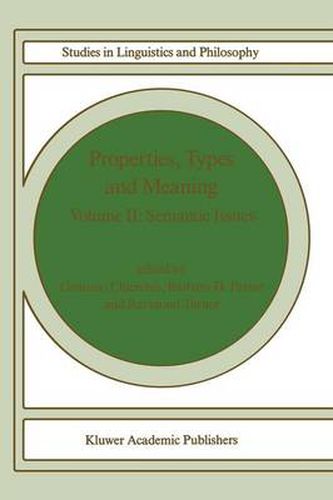Readings Newsletter
Become a Readings Member to make your shopping experience even easier.
Sign in or sign up for free!
You’re not far away from qualifying for FREE standard shipping within Australia
You’ve qualified for FREE standard shipping within Australia
The cart is loading…






This title is printed to order. This book may have been self-published. If so, we cannot guarantee the quality of the content. In the main most books will have gone through the editing process however some may not. We therefore suggest that you be aware of this before ordering this book. If in doubt check either the author or publisher’s details as we are unable to accept any returns unless they are faulty. Please contact us if you have any questions.
This collection of papers stems originally from a conference on Property Theory, Type Theory and Semantics held in Amherst on March 13-16 1986. The conference brought together logicians, philosophers, com puter scientists and linguists who had been working on these issues (of ten in isolation from one another). Our intent was to boost debate and exchange of ideas on these fundamental issues at a time of rapid change in semantics and cognitive science. The papers published in this work have evolved substantially since their original presentation at the conference. Given their scope, we thought it convenient to divide the work into two volumes. The first deals primarily with logical and philosophical foundations, the second with more empirical semantic issues. While there is a common set of issues tying the two volumes together, they are both self-contained and can be read independently of one another. Two of the papers in the present collection (van Benthem in volume 1 and Chierchia in volume II) were not actually read at the conference. They are nevertheless included here for their direct relevance to the topics of the volumes. Regrettably, some of the papers that were presented (Feferman, Klein, and Plotkin) could not be included in the present work due to timing problems. We nevertheless thank the authors for their contribu tion in terms of ideas and participation in the debate.
$9.00 standard shipping within Australia
FREE standard shipping within Australia for orders over $100.00
Express & International shipping calculated at checkout
This title is printed to order. This book may have been self-published. If so, we cannot guarantee the quality of the content. In the main most books will have gone through the editing process however some may not. We therefore suggest that you be aware of this before ordering this book. If in doubt check either the author or publisher’s details as we are unable to accept any returns unless they are faulty. Please contact us if you have any questions.
This collection of papers stems originally from a conference on Property Theory, Type Theory and Semantics held in Amherst on March 13-16 1986. The conference brought together logicians, philosophers, com puter scientists and linguists who had been working on these issues (of ten in isolation from one another). Our intent was to boost debate and exchange of ideas on these fundamental issues at a time of rapid change in semantics and cognitive science. The papers published in this work have evolved substantially since their original presentation at the conference. Given their scope, we thought it convenient to divide the work into two volumes. The first deals primarily with logical and philosophical foundations, the second with more empirical semantic issues. While there is a common set of issues tying the two volumes together, they are both self-contained and can be read independently of one another. Two of the papers in the present collection (van Benthem in volume 1 and Chierchia in volume II) were not actually read at the conference. They are nevertheless included here for their direct relevance to the topics of the volumes. Regrettably, some of the papers that were presented (Feferman, Klein, and Plotkin) could not be included in the present work due to timing problems. We nevertheless thank the authors for their contribu tion in terms of ideas and participation in the debate.